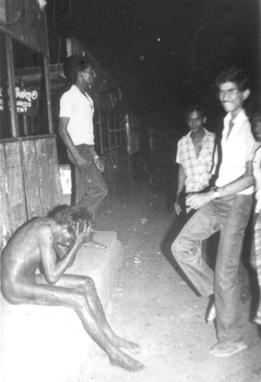Related Research Articles

The history of Sri Lanka is unique because its relevance and richness extend beyond the areas of South Asia, Southeast Asia and the Indian Ocean. The early human remains which were found on the island of Sri Lanka date back to about 38,000 years ago.

Parliamentary elections were held in Sri Lanka on 2 April 2004. The ruling United National Party of Prime Minister Ranil Wickremesinghe was defeated, winning only eighty two seats in the 225-member Sri Lankan parliament. The opposition United People's Freedom Alliance won 105 seats. While this was eight seats short of an absolute majority, the Alliance was able to form a government.

Kovilage Anton Vijaya Kumaranatunga, popularly known as Vijaya Kumaratunga, was a Sri Lankan actor, playback singer and politician regarded as one of the most popular icons in Sri Lankan cinema of all time. He was married to former Sri Lankan President Chandrika Kumaranatunga from 1978 until his assassination in 1988. He was the Founder of Sri Lanka Mahajana Party.

The Janatha Vimukthi Peramuna is a leftist political party in Sri Lanka. The party was formerly a revolutionary movement and was involved in two armed uprisings against the government of Sri Lanka: once in 1971 (SLFP), and another in 1987–1989 (UNP). The motive for both uprisings was to establish a socialist state. Since then the JVP has entered mainstream democratic politics and has updated its ideology, abandoning some of its original Marxist policies such as the abolition of private property. The JVP has been led by President Anura Kumara Dissanayake since 2014.
The United People's Freedom Alliance was a political alliance in Sri Lanka founded by former Sri Lankan president Chandrika Kumaratunga in 2004 and dissolved by former Sri Lankan President Maithripala Sirisena in 2019.

The 1987–1989 JVP insurrection, also known as the 1988–1989 revolt or the JVP troubles, was an armed revolt in Sri Lanka, led by the Marxist–Leninist Janatha Vimukthi Peramuna, against the Government of Sri Lanka. The insurrection, like the previous one in 1971, was unsuccessful. The main phase of the insurrection was a low-intensity conflict that lasted from April 1987 to December 1989. The insurgents led by the JVP resorted to subversion, assassinations, raids, and attacks on military and civilian targets while the Sri Lankan government reacted through counter-insurgency operations to suppress the revolt.

Black July was an anti-Tamil pogrom that occurred in Sri Lanka during July 1983. The pogrom was premeditated, and was finally triggered by a deadly ambush on a Sri Lankan Army patrol by the Liberation Tigers of Tamil Eelam (LTTE) on 23 July 1983, which killed 13 soldiers. Although initially orchestrated by members of the ruling UNP, the pogrom soon escalated into mass violence with significant public participation.

Parliamentary elections were held in Sri Lanka on 16 August 1994. They marked the decisive end of seventeen years of United National Party rule and a revival of Sri Lankan democracy.

The Sri Lankan state has been accused of state terrorism against the Tamil minority as well as the Sinhalese majority, during the two Marxist–Leninist insurrections. The Sri Lankan government and the Sri Lankan Armed Forces have been charged with massacres, indiscriminate shelling and bombing, extrajudicial killings, rape, torture, disappearance, arbitrary detention, forced displacement and economic blockade. According to Amnesty International, state terror was institutionalized into Sri Lanka's laws, government and society.
In 1998, allegations of mass graves at Chemmani were made by a Sri Lankan soldier on trial for rape and murder. He claimed hundreds of people who disappeared from the Jaffna peninsula after it was retaken by Government troops from the LTTE in 1995 and 1996 were killed and buried in mass graves near the village of Chemmani. There are reports about 300 to 400 bodies being buried there.

The Duraiappa stadium mass grave was discovered and excavated at the Duraiappah Sports Stadium in the formerly embattled northern city of Jaffna, Sri Lanka, during a period of relative calm between civil conflicts. The mass grave was unearthed in stages between April 4 and 10 of 1999.
The Jathika Nidahas Peramuna (JNP) or National Freedom Front (NFF) is a political party in Sri Lanka which was formed by ten JVP parliamentarians led by Wimal Weerawansa, as a breakaway group of the Janatha Vimukthi Peramuna (JVP).

The 1987 grenade attack in the Sri Lankan Parliament is an attack that took place on August 18, 1987, when an assailant hurled two grenades into a room where the Sri Lankan president, prime minister and Member of Parliament members of parliament were meeting. The grenades bounced off the table at which president J. R. Jayawardene and prime minister Ranasinghe Premadasa were sitting, and rolled away. A member of parliament and a ministry secretary were killed by the explosions.

The history of Sri Lanka from 1948 to the present is marked by the independence of the country through to Dominion and becoming a Republic.

Deshapremi Janatha Vyaparaya was a militant organisation in Sri Lanka. It was widely considered to be the military branch of the Marxist–Leninist Janatha Vimukthi Peramuna and had been designated as a terrorist organisation by the Sri Lankan government.
Terrorism in Sri Lanka has been a highly destructive phenomenon during the 20th and 21st centuries, especially so during the periods of the Sri Lankan Civil War (1983–2009) and the first (1971) and second JVP insurrections (1987–1989). A common definition of terrorism is the systematic or threatened use of violence to intimidate a population or government for political, religious, or ideological goals. Sri Lanka is a country that has experienced some of the worst known acts of modern terrorism, such as suicide bombings, massacres of civilians and assassination of political and social leaders. Terrorism has posed a significant threat to the society, economy and development of the country. The Prevention of Terrorism Act of 1978 is the legislation that provides the powers to law enforcement officers to deal with issues related to terrorism in Sri Lanka. It was first enacted as a temporary law in 1979 under the presidency of J. R. Jayewardene, and later made permanent in 1982.
The Batalanda detention centre was an alleged detention centre located within the Batalanda Housing Scheme of the State Fertiliser Corporation in the village of Butalanda, situated in the Biyagama Electorate. It was used by the Counter Subversive Unit of the Sri Lanka Police during the 1987–89 JVP insurrection to detain persons who were linked to or suspected to have links to the Janatha Vimukthi Peramuna (JVP), as part of the counterinsurgency campaign launched by the United National Party (UNP) government led by President Ranasinghe Premadasa.
The attack on the Sri Lankan Armed Forces (SLAF) base in Pallekele was an attack carried out by the Patriotic People's Armed Troops together with the Patriotic People's Movement, which were armed divisions of the Janatha Vimukthi Peramuna. The attack was led by Keerthi Vijayabahu, as a preparation for the 1987-1989 JVP insurrection.
Patriotic People's Armed Troops was a militant organization in Sri Lanka. The organization was recognized as a military arm of the Marxist Janatha Vimukthi Peramuna, which was attempting to overthrow the government of Sri Lanka.

Vijaya Kumaratunga, Sri Lankan politician and founder of the Sri Lanka Mahajana Pakshaya, was assassinated by an assassin of the militant organization Deshapremi Janatha Viyaparaya (DJV) on February 16, 1988, while attempting to leave his home in Polhengoda in Colombo.
References
- ↑ "The Magic of Weerawila Lake". Gamini Akmeemana. Archived from the original on 16 February 2008. Retrieved 2 January 2009.
- 1 2 3 Gunaratna, Rohan (1990). Sri Lanka, a lost revolution?: The inside story of the JVP. Institute of Fundamental Studies. ISBN 978-955-26-0004-3.
- 1 2 Editorial review- Thursday 17 August 2000
- ↑ JVP: Lessons for the Genuine Left Archived 2007-10-13 at the Wayback Machine
- ↑ Gananath Obeyesekere, "Narratives of the self: Chevalier Peter Dillon's Fijian cannibal adventures", in Barbara Creed, Jeanette Hoorn, Body Trade: captivity, cannibalism and colonialism in the Pacific, Routledge, 2001, p. 100. ISBN 0-415-93884-8. "The 'time of dread' was roughly 1985-89, when ethnic Sinhalese youth took over vast areas of the country and practiced enormous atrocities; they were only eliminated by equally dreadful state terrorism."
- ↑ UNHCHR Report on mass graves in Sri Lanka
- ↑ TITLE: SRI LANKA HUMAN RIGHTS PRACTICES, 1994
- ↑ Speech by Neelan Tiruchelvam at the Debate on the Emergency [usurped]
- ↑ US gives negative report
- ↑ SRI LANKA HUMAN RIGHTS PRACTICES - 1995
- ↑ SRI LANKA HUMAN RIGHTS PRACTICES - 1998
- ↑ Sooriyakanda student massacre A survivor recalls the days of horror -Ceylon Today
